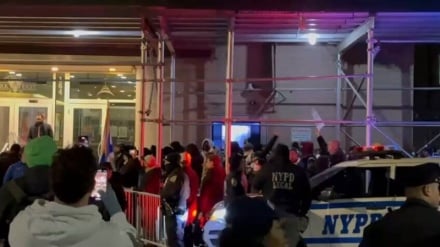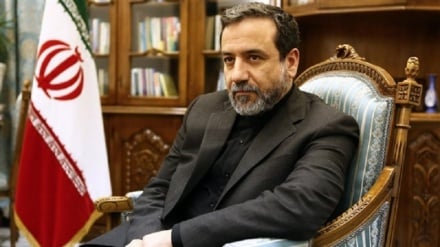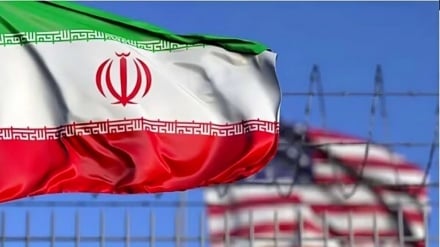Dem candidates attack Trump's Korea policy – from the Right
At the first US Democratic presidential debate, on June 27, Senator Kamala Harris called North Korea “a real threat in terms of its nuclear arsenal” and said President Donald Trump “embraces” the country’s Leader Kim Jong-un for the sake of a photo op.”
Senator Elizabeth Warren continued the attack in a tweet a few days later, saying that instead of “squandering American influence on photo ops,” the United States “should be dealing with North Korea through principled diplomacy that promotes US security, defends US’s allies, and upholds human rights.”
Now we have an article in this regard by Tim Shorrock, a Washington, DC–based journalist, titled: “Dem candidates attack Trump's Korea policy – from the Right.”
Led by former US Vice President Joe Biden, the leading Democratic candidates for president in 2020 have focused on President Trump’s friendly, though presently shaky, relationship with North Korea’s Kim Jong-un as a prime example of a foreign policy that’s gone off the establishment tracks and left traditional US allies in the dust. With their next televised debate, Biden and most of his competitors hope to convince voters—especially those who voted Republican in 2016—that Trump’s personalized style of US power projection presents an existential danger not only to the United States but also to its friends around the world.
Even as Trump and Kim announced at the DMZ that their new negotiating teams would soon begin a new round of talks, Biden continued his line of attack, declaring on Twitter and in the CNN interview that the conversation at the border was merely a “photo op” that “gave Kim everything that he wanted: legitimacy.” Since then, of course, those talks have been delayed by continued disputes between Washington and Pyongyang, most lately about an upcoming series of US–South Korean military exercises and the North’s latest test of two short-range missiles.
Still, Biden’s competitors have kept up the political offensive. At the first Democratic debate, on June 27, Senator Kamala Harris called North Korea “a real threat in terms of its nuclear arsenal” and said Trump “embraces” Kim for the sake of a photo op.” Senator Elizabeth Warren continued the attack in a tweet a few days later, saying that instead of “squandering American influence on photo ops,” the United States “should be dealing with North Korea through principled diplomacy that promotes US security, defends US’s allies, and upholds human rights.”
Senator Bernie Sanders, in contrast, has been more nuanced. He told ABC’s This Week “I have no problem with Trump’s sitting down with Kim Jong-un.” But in his view, he said, Trump has badly damaged the State Department and its ability to manage foreign affairs. He added “We need to move forward diplomatically, not just do photo opportunities.”
It’s a close race for the Democratic nomination: In a poll released July 19 by NBC News, Biden led the pack with 25 percent, with Sanders and Warren holding steady at 16 percent and Harris just behind at 14 percent. This week, a CBS poll had it even closer, with Biden still at 25 percent, but with Warren at 20, Harris at 16 and Sanders at 15.
When it comes to foreign policy, Biden has been by far the most outspoken. He outlined his philosophy in a major speech on July 11, in which he castigated Trump as an “extreme” threat to US national security and again criticized his “cozy” relationship with Kim.
But the former vice president’s alternative policy on Korea, spelled out in his earlier interview with CNN, was a throwback to his days in the Obama administration, which contrary to a ludicrous claim by Trump at the DMZ, rejected the idea of direct talks with North Korea unless Pyongyang gave up its nuclear weapons first.
Biden told CNN Trump “ended our relationship, as a practical matter, with South Korea and Japan as a united front and let China off the hook.” He accused Kim of doing nothing in return. He asked “And what have we done? We’ve suspended exercises.” Asked what he’d do differently, Biden offered a taste of the militarism that Trump tried in 2017. He said “I make it clear that we’re going to move our defenses up, as we did before, and we’re going to make sure we have the capacity to deal with it near term. I’m going to let South Korea and Japan know we’re there for them. We are their nuclear umbrella. We’re there for them. And China understands, if you don’t want us in your throat here, if you don’t want us in your face, do something.”
Any discussion of the peace process, in fact, must begin in South Korea. The talks between Trump and Kim only came about because of the encouragement of President Moon, who began the current wave of diplomacy in January 2018 when he invited Kim to send emissaries to the Winter Olympics in the South. Even Shinzo Abe, Japan’s right-wing prime minister and Trump’s closest ally in Asia, has jumped on the bandwagon, offering his own direct talks with Kim.
Biden’s emphasis on the nuclear umbrella—under which the United States has pledged to defend South Korea and Japan with its own weapons—also shows an appalling lack of understanding about the North and its motives. Those weapons, which are carried on US ships and planes in the Pacific region, are part of the arsenal that Kim Jong-un would like to see directed elsewhere, and they explain why he has insisted on the wording “denuclearization of the Korean Peninsula” in any joint statements with Trump. It’s also a key issue for South Korean peace activists.
Tae-ho Lee, an activist with People’s Solidarity for Participatory Democracy, one of the largest and most influential NGOs in South Korea, said during a recent visit to Washington “There’s been a lack of discussion about what South Korea and the US should give up to help North Korea give up its nuclear weapons,” adding, “Security assurances to North Korea are impossible without removal of the nuclear umbrella.” He also said the combination of the US and South Korean militaries, linked in an alliance since 1954, are an “overwhelming power.” He pointed out, for the past 30 years, South Korea’s military spending alone has been higher than North Korea’s entire GDP.
Sanders, alone among the Democratic candidates, has been paying attention to and meeting with peace activists and has incorporated into his platform some of their ideas for engagement. He recently used a campaign video that featured an interview with Christine Ahn, Executive Director of Women Cross DMZ, to argue that Trump’s insistence on tough sanctions until an agreement is reached is threatening progress. He says “Peace is the best path for American security.” Sanders’s stance is winning support from other progressives within Democratic ranks, such as Representative Ro Khanna of California, a Sanders backer who was the primary author of a bill that passed the full House on July 11 calling for a “binding peace agreement” to bring a formal end to the Korean War. Khanna’s bill, an amendment to a National Defense Authorization Act for fiscal year 2020, marked the first time that Congress had taken a stand on ending the 70-year-old war.
The vote was the result of intense lobbying by an array of peace groups, including Ploughshares, Win Without War, and Peace Action. In a statement, Ahn called the vote on the Khanna amendment a “game-changer.” She added: “It’s a clear sign that the American people want an end to the oldest U.S. conflict, and that ending decades of hostilities with a peace agreement is the only way to resolve the nuclear crisis.” In a sign that civil society groups may be having an impact on the Trump administration, Ahn and Hyun Lee, US National Organizer for Women Cross DMZ and the Korea Peace Treaty Campaign recently met with Stephen Biegun, Trump’s chief negotiator, to discuss the prospects for peace.
In the weeks after Trump’s meeting with Kim at the DMZ, close analysts of the Korea situation, and the South Korean officials who have been in discussion with the White House, predicted that the next step in US–North Korean talks will involve North Korea’s giving up a major chunk of its nuclear program in return for a partial lifting of US and UN sanctions that are crippling the most vulnerable parts of the North’s economy. That would move both sides past the disastrous summit in Hanoi in late February, when Trump walked out after unsuccessfully pressing Kim to accept a deal that would have involved the North giving up its entire weapons program before obtaining any sanctions relief whatsoever. This was seen in Pyongyang as a demand for surrender or capitulation—something they have said they will never do.
Biegun expressed the new US flexibility a day before Trump’s meeting at the DMZ, when he informed his South Korea counterpart, Lee Do-hoon, that the US government was prepared to move the US–North Korean negotiations forward “simultaneously and in a parallel” manner. Biegun, whose role was eclipsed in Hanoi by John Bolton, Trump’s hardline national security adviser, added in a speech to the conservative Atlantic Council on June 19 that “the door is wide open” for negotiations, and said he and his North Korean partner were committed to “regain our momentum” by returning to the basic areas of agreement—including establishing new US–North Korean political relations and building a “lasting and stable peace regime”—that came out of the first summit in Singapore in June 2018. Bolton, as many observers noted, was nowhere to be seen at Trump’s meeting at the DMZ.
Despite Biegun’s signaling and Trump’s insistence that he’s in “no hurry” to get an agreement, North Korea recently complained about new US military exercises with South Korea, and said they make it hard to trust the United States. In statements carried on its official news agency, KCNA, the North Korean foreign ministry said the upcoming “Alliance” drills scheduled for August are “clearly a breach of the main spirit” of the June 12 statement in Singapore, where Trump canceled large-scale military drills and—to the shock of many—called them “provocative.”
Underscoring its concerns, on Monday KCNA broadcast photographs of Kim examining a new submarine that experts cited by The Wall Street Journal “believe could carry multiple missiles, including those with nuclear capabilities.” And then came this week’s launch of what South Korea called a “new kind of short-range ballistic missile,” one that is similar to two projectiles fired last May. North Korea, in a KCNA dispatch, said the test was a message to South Korean “warmongers who are running high fever in their moves to introduce the ultramodern offensive weapons into South Korea and hold military exercise in defiance of the repeated warnings from” the North. Recently, the South began deploying the first of 40 F-35A advanced fighter jets made by Lockheed Martin.
Democratic Sen. Amy Klobuchar said Trump was being naïve in thinking that a handshake would automatically translate into progress. Klobuchar said on CNN “Of course, as a country, we want this to work. We want to see a denuclearization of the Korean Peninsula, a reduction in these missiles.” adding, “And, when you go forward, you have to have clear focus and a clear mission and clear goals.”
Former Rep. Beto O’Rourke also pointed out that Trump’s grandstanding aside, there hasn’t been any real progress in getting North Korea to abandon its nuclear program. He said on CBS’ Face the Nation “Despite three years of almost bizarre foreign policy from this president, this country is no safer when it comes to North Korea. They have removed none of their nuclear weapons or their potential to deliver them to the United States. And, in fact, in contravention of the United Nations they have launched other missiles flouting the diplomacy that this President has attempted so far. So, we’ve added legitimacy to Kim Jong Un.”
ME/ME


